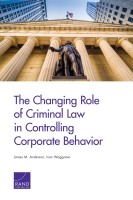| 来源类型 | Research Reports
|
| 规范类型 | 报告
|
| ISBN | 9780833087867
|
| 来源ID | RR-412-ICJ
|
| The Changing Role of Criminal Law in Controlling Corporate Behavior |
| James M. Anderson; Ivan Waggoner
|
| 发表日期 | 2014
|
| 出版年 | 2014
|
| 页码 | 146
|
| 语种 | 英语
|
| 结论 |
There Is Mixed Evidence About the Changing Role of Criminal Law in Regulating and Controlling Corporate Activity- With the exceptions of the application of the Sarbanes-Oxley Act and the Foreign Corrupt Practices Act, the number of criminal prosecutions of corporations has declined in recent years, suggesting less formal prosecutorial activity rather than more. However, use of deferred-prosecution agreements (DPAs), nonprosecution agreements (NPAs), and debarment activity has increased sharply, suggesting that the threat of criminal action is still playing an important role in controlling behavior in this context.
|
| 摘要 |
- Recognize that criminal sanctions in this context are instrumental tools and not moral judgments. Lawmakers should be reluctant to pass statutes that punish without proof of criminal intent, courts should be reluctant to interpret statutes in ways that ignore criminal intent, and prosecutors should bring such prosecutions sparingly.
- Have judges review deferred-prosecution and nonprosecution agreements. This practice would provide some assurance that the agreements are genuinely in the public interest and might allow third parties affected by the agreements to air their objections in a neutral forum. Policymakers should give serious consideration to requiring that every DPA and NPA be reviewed by an appropriate federal judge. This practice would provide additional transparency and reassure the public that justice was being served.
- Carefully review debarment provisions. Debarment decisions should be made on a case-by-case basis by the relevant governmental agency, depending on the severity of the allegations made and their relevance to the domain of the governmental entity.
- Consider substituting the use of civil sanctions. In many cases, civil sanctions that include formal fact-finding might function as well as or better than criminal sanctions.
|
| 主题 | Corporate Governance
; Criminal Law
; Sarbanes-Oxley Act of 2002
; White Collar Crime
|
| URL | https://www.rand.org/pubs/research_reports/RR412.html
|
| 来源智库 | RAND Corporation (United States)
|
| 资源类型 | 智库出版物
|
| 条目标识符 | http://119.78.100.153/handle/2XGU8XDN/107849
|
推荐引用方式
GB/T 7714 |
James M. Anderson,Ivan Waggoner. The Changing Role of Criminal Law in Controlling Corporate Behavior. 2014.
|
|
文件名:
|
x1495316374234.jpg
|
|
格式:
|
JPEG
|

|
文件名:
|
RAND_RR412.pdf
|
|
格式:
|
Adobe PDF
|
除非特别说明,本系统中所有内容都受版权保护,并保留所有权利。